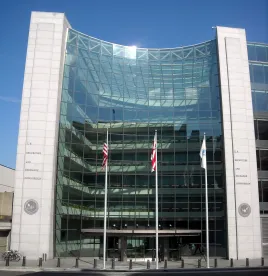In a notice issued on April 8, 2019, the Securities and Exchange Commission (SEC) agreed to grant exemptive relief that will allow Precidian Investments (Precidian) to launch the first actively managed exchange-traded funds (ETFs) that do not provide daily portfolio transparency to the general public (ActiveShares ETFs). Up until now, the SEC has conditioned approval of actively managed ETF exemptive relief on the daily publication of portfolio holdings. This is a significant regulatory development that signals the SEC’s willingness to work with industry participants to develop innovative ETFs.
Background
Unlike mutual funds, all ETFs that are organized as investment companies under the Investment Company Act of 1940 (the 1940 Act) currently operate under SEC exemptions from the 1940 Act that permit shares of the ETFs to be listed and traded on secondary markets at market prices, rather than at their respective net asset value per share (NAV). In granting such exemptions, the SEC has historically required an actively managed ETF to disclose its portfolio holdings on a daily basis to help ensure that the ETF’s shares trade at prices at or close to its NAV. Knowledge of an ETF’s portfolio allows Authorized Participants (APs), market-makers, and other market participants to value the portfolio securities and compare against the ETF’s market price throughout the day, which enables them to evaluate arbitrage and hedging opportunities.
On the other hand, investment advisers have been reluctant to offer their investment strategies in actively managed ETFs because daily disclosure of portfolio holdings could put them at a competitive disadvantage. Investment advisers have been concerned that their investment strategies could be reverse-engineered and their market insights and trading strategies could be replicated. Also, others could "front-run" their fund by trading on knowledge that the ETF would be making a transaction in a portfolio security and thus impact the price of the security.
Precidian first filed an application in 2013 for an SEC exemptive order that would allow it to offer nontransparent, actively managed ETFs. Since that time, Precidian, and other applicants requesting relief for non- or semitransparent ETFs have proposed a variety of mechanisms to facilitate efficient arbitrage without full portfolio transparency.
Precidian ActiveShares ETF Process
The SEC approved Precidian’s process to operate an actively managed ETF without full portfolio transparency. To conceal an ActiveShares ETF’s portfolio holdings identity and weightings from the public, the ETF will sell and redeem creation units to and from Authorized Participants (APs) through unaffiliated broker-dealers who will act on an agency basis (AP Representatives) using confidential brokerage accounts. The AP Representative will be the only one who is provided with information regarding the basket of securities that the ActiveShares ETF will exchange for its shares. The AP Representative will receive cash equal to the value of the basket of securities from an AP when it purchases creation units, and for redemptions, the process will work in reverse, thereby allowing for in-kind transactions between the APs and the ActiveShares ETF.
To address the SEC’s concerns that there be enough market data to allow for efficient arbitrage, an AciveShares ETF’s primary listing exchange will disseminate a “verified intraday indicative value,” or “VIIV,” intended to provide investors with the underlying value of an ETF share, at one-second intervals throughout the day. Precidian’s exemptive application describes minimum requirements for the calculation and verification of the VIIV. Each ActiveShares ETF will be required to adopt procedures for calculation and dissemination of the VIIV, subject to oversight by its board, and to disclose information regarding the VIIV on its website. Also, to help ensure accurate calculation of the VIIV, an ActiveShares ETF’s portfolio instruments will be limited to those traded on U.S. exchanges contemporaneously with the ETF.
In the chart below are some of the important differences between traditional ETFs and the proposed ActiveShares ETFs.
|
|
Traditional ETFs |
ActiveShares ETFs |
|
Daily Portfolio Transparency |
Yes |
No, but any securities without readily available market quotations would be publicly disclosed |
|
Creation/Redemption Process |
Transactions directly with APs |
Transactions with APs through unaffiliated broker-dealers acting on an agency basis, using a confidential account |
|
Intraday Information |
Exchange publishes an “intraday indicative value” every 15 seconds during the trading day |
Exchange publishes a VIIV once per second throughout each trading day; ETF advisers, with board oversight, are responsible calculation process |
|
Portfolio Instruments |
No restrictions |
Securities and other instruments that trade on U.S. exchanges contemporaneously with the ETF shares and cash and cash equivalents; no illiquid investments may be made |
Protective Conditions/Remedial Actions
In addition to the requirements mentioned above, an ActiveShares ETF will be subject to the following protective conditions and must take certain remedial actions as discussed further below.
-
Include a required legend at the front of its prospectus, summary prospectus, website and marketing materials
-
Comply with Regulation Fair Disclosure (Reg FD) as though it applied to it
-
Take certain remedial actions, including by the board, if the ActiveShares ETF exceeds certain levels of premium/discount and bid/ask spreads
ActiveShares ETF Legend
Each ActiveShares ETF will be required to include the following legend on the front cover its prospectus to help prevent shareholder confusion between ActiveShares and traditional ETFs.
| ActiveShares ETFs Legend | ||
|
This ETF is Different From Traditional ETFs. Traditional ETFs tell the public what assets they hold each day. This ETF will not. This may create additional risks for your investment. For example:
The differences between this ETF and other ETFs may also have advantages. By keeping certain information about the ETF secret, this ETF may face less risk that other traders can predict or copy its investment strategy. This may improve the ETF’s performance. If other traders are able to copy or predict the ETF’s investment strategy, however, this may hurt the ETF’s performance. For additional information regarding the unique attributes and risks of the ETF, see section [ ] below. |
Regulation Fair Disclosure (Reg FD)
Although Reg FD does not apply to ETFs, ActiveShares ETFs have agreed to comply with the regulatory requirements to prevent select disclosure of material nonpublic information since such disclosure would be more likely to provide an unfair advantage to the recipient than would be the case with traditional ETFs. Managers of ActiveShares ETFs must also require AP Representatives and certain other service providers to agree to comply with the requirements of Reg FD.
Board Oversight/Remedial Actions
For at least the first three years following the launch of the ActiveShares ETF, its board will be required to meet promptly to consider remedial actions if, for 15 days in a row or 30 or more days in any quarter, the fund’s premium/discount or bid/ask spread exceeds 1%. The board will need to consider whether to adopt appropriate remedial measures to reduce the premium/discount and and/or bid/ask spread. The board will also need to consider whether the ETF's shareholders are being harmed and the continuing viability of the ActiveShares ETF. For the first three years following the launch of an ActiveShares ETF, its board will also be required to consider the foregoing on an annual basis, regardless of the level of the premium/discount and bid/ask spread.
Practice Points
According to Precidian's application for exemptive relief, licensed managers may file their exemptive applications by incorporating by reference all the terms and conditions in the Precidian application. Various asset managers have entered into license agreements with Precidian that would permit those managers to offer ActiveShares ETFs.
In addition to licensing considerations, managers will also need to review and implement new compliance and board policies and operational procedures to address the creation and redemption process and protective conditions and remedial actions discussed above. ActiveShares ETFs will also need to ensure that appropriate agreements are in place with APs, AP Representatives, and other service providers to ensure that the requirements of the exemptive order are satisfied.






 />i
/>i

